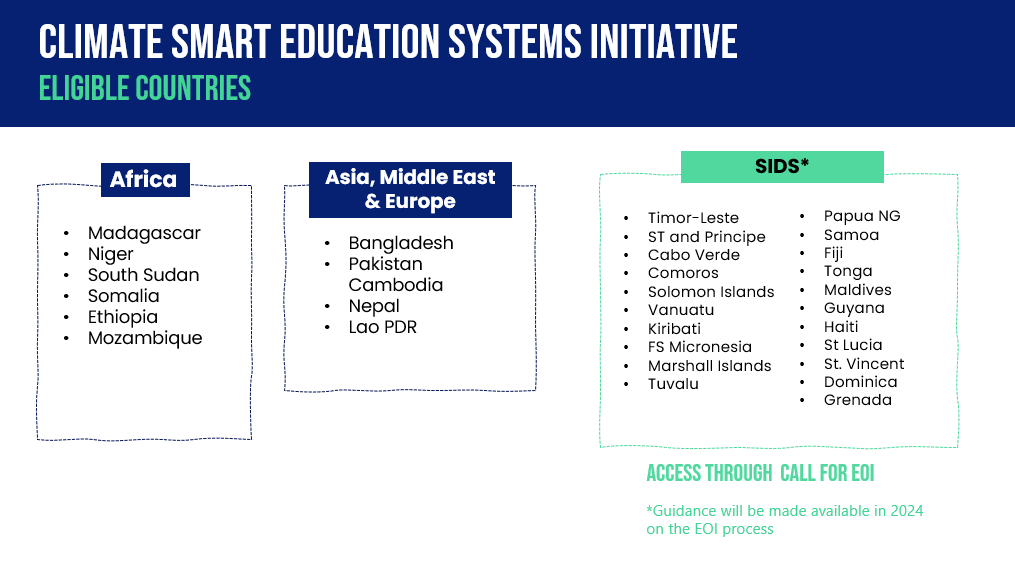Support to education system transformation
Multiple partner countries are affected by cross-sectoral challenges that impede children’s learning.
Due to their complex nature with origins and solutions in multiple sectors, these challenges are not easily addressed by education ministries alone.
By bringing partnership solutions to test and scale promising approaches, the technical assistance initiatives can bridge capacity gaps to address these bottlenecks and reinforce countries’ efforts to achieve their desired education system reforms.
Current initiatives
Climate Smart Education Systems Initiative
Partners: Save the Children and UNESCO and UNESCO-IIEP
Objective: GPE seeks to enhance countries' capacities to mainstream climate change adaptation and environmental sustainability into education sector plans, budgets and strategies, as well as enhance education ministry capacity for cross-sectoral coordination on climate and environment-related policy and programming.
The Climate Smart Education System Initiative has a $16 million budget envelope. It will roll out progressively, with about 22 countries accessing support in a phased approach over the next 2 years.
Participating ministries should dedicate 12-18 months of engagement with initiative partners and GPE, starting with an inception phase (scoping; prioritization of country needs), followed by the development of a country work plan and the implementation of technical support valued at between US$400,000 and $700,000. Countries are prioritized to receive this support on the basis of high climate vulnerability.
Monitoring, Evaluation and Learning Initiative
Partner: Social Impact
Objective: Supports country capacity to generate, learn from and use evidence. It does so by establishing or strengthening data systems (monitoring, EMIS, evaluation architecture, and mechanisms for policy uptake of evidence) and by supporting monitoring, evaluation and learning of transformational programs and policies identified in national partnership compacts.
The Monitoring, Evaluation and Learning Initiative is in pilot phase, currently supporting Dominica, Grenada, Saint Lucia, Saint Vincent and the Grenadines (with the Organization of Eastern Caribbean States), as well as The Gambia, Uzbekistan and El Salvador. Early learning from the initiative’s first phase will be used to inform further consideration of expanding this support to additional countries.
Education Data Leadership Program
Objective: Leverage business expertise to strengthen education ministries' capacity to collect, organize, store, share and disseminate education data.
The EDLP pilot in The Gambia is as a public-private partnership with support from Cisco and Microsoft, which aims to deliver tailored capacity on education data for The Gambia's ministry of education and school management for supporting improved learning outcomes.
The initiative is in pilot phase, currently supporting The Gambia to identify, through a public-private partnership with Cisco and Microsoft, ways to strengthen the capacities of EMIS staff and data systems to help generate and measure learning outcomes.
- Cisco will be supporting The Gambia at central level in addressing capacity needs in data analytics among staff at the ministry and regional office levels.
- Microsoft provided a comprehensive technical diagnosis to facilitate the deployment of devices and software for digitizing regional and school-level data related to school performance and student learning.
Learning from this pilot will be used to inform GPE’s strategic engagement with the private sector.
Initiatives under development
These four new initiatives are piloting support in 2024, with initial results informing consideration to scale them to additional countries.
School Nutrition Technical Assistance Facility
Partners: School Meals Coalition and World Food Programme
Objective: Reinforce country capacity to achieve increasingly sustainable, gender-responsive and nationally owned school meals programs, providing school children with safe, diverse, nutritious foods that are locally purchased.
Gender Equality Initiative
Partners: Gender at the Center Initiative, UNGEI and UNESCO-IIEP
Objective: Building on the Gender at the Center Initiative’s first phase, this initiative will support governments to reinforce the capacity of education ministries to use data and evidence to improve gender equality in education; and to strengthen engagement by education ministries, local education groups, civil society and young activists to actively get involved in inclusive dialogue on gender-transformative education.
Safe Learning Initiative
Partners: Safe to Learn Coalition
Objective: Build country capacity to integrate violence prevention mechanisms within education systems and create safe learning environments for children. The initiative aims to bring the expertise of the Safe to Learn Coalition to support countries to address gaps to ensure that every child learns in a safe, inclusive, equitable and gender transformative environment.
Technology for Education Initiative
Partner: UNICEF in consortium with the EdTech Hub
Objective: Strengthen capacity of partner countries to use technology to improve education access and learning outcomes for children.
This initiative will provide technical, policy and cross-sectoral assistance for countries embedding or scaling technology into their education systems.



